Biography
Zemer was born in Kansas City, Missouri, on January 1, 1932. Zemer grew up in Cleveland, Ohio. When he was eight years old, his mother died, and his father placed him for adoption with his brother and sister-in-law, Shmuel and Sarah (Riklin) Zeger in Omaha, Nebraska, where he grew up and was educated. In 1945, he moved with his family to Los Angeles, California, where his family joined Temple Beth Shalom, and where Zemer began religious studies. In 1953, Zemer received his BA in Psychology from UCLA. In 1960, he was ordained as a Rabbi at the Hebrew Union College (HUC) – Jewish Institute of Religion in Cincinnati, Ohio, where he also received a doctorate in Jewish Studies. Following his ordination, he studied at the Hebrew University of Jerusalem in 1960 and 1961. Following his studies, Zemer became Rabbi of Temple Emanuel of Baltimore, in Baltimore, Maryland, where he served as Rabbi until 1963.
In 1963 Zemer made Aliyah and became the Rabbi of Congregation "Kehilat Ha'Sharon" in Kfar Shmaryahu. In 1964 Zemer established Congregation "Emet Ve'Anava" in Ramat Gan, and in 1968 he established Congregation Kedem in Tel Aviv, which he headed for the following twenty years. Zemer also served on the Israel Movement for Progressive Judaism Board, on the Board of CCCR (Central Conference of American Rabbis), and MARAM - (the Council of Progressive Rabbis in Israel). He also served as a senior lecturer of Halachic studies at the HUC in Jerusalem. In 1993 Zemer wrote the book "Sane Judaism," in which he laid out his vision of progressive Jewish law (Halachah), which gives current answers to the needs of individuals and society in modern times. In 2004 Zemer was awarded an honorary doctorate degree from the Hebrew Union College (HUC) in Jerusalem.
The Moshe Zemer award was established by MARAM, and is awarded to a rabbi or rabbinical student who has researched and developed questions and answers on a current event in Israel.
Zemer died on November 3, 2011, and was buried in Kibbutz Kiryat Anavim.

Reform Judaism, also known as Liberal Judaism or Progressive Judaism, is a major Jewish denomination that emphasizes the evolving nature of Judaism, the superiority of its ethical aspects to its ceremonial ones, and belief in a continuous search for truth and knowledge, which is closely intertwined with human reason and not limited to the theophany at Mount Sinai. A highly liberal strand of Judaism, it is characterized by lessened stress on ritual and personal observance, regarding halakha as non-binding and the individual Jew as autonomous, and great openness to external influences and progressive values.
The Rabbinical Assembly (RA) is the international association of Conservative rabbis. The RA was founded in 1901 to shape the ideology, programs, and practices of the Conservative movement. It publishes prayerbooks and books of Jewish interest, and oversees the work of the Committee on Jewish Law and Standards for the Conservative movement. It organizes conferences and coordinates the Joint Placement Commission of the Conservative movement. Members of the RA serve as rabbis, educators, community workers and military and hospital chaplains around the world.
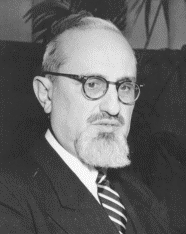
Joseph Ber Soloveitchik was a major American Orthodox rabbi, Talmudist, and modern Jewish philosopher. He was a scion of the Lithuanian Jewish Soloveitchik rabbinic dynasty.

Conversion to Judaism is the process by which non-Jews adopt the Jewish religion and become members of the Jewish ethnoreligious community. It thus resembles both conversion to other religions and naturalization. The procedure and requirements for conversion depend on the sponsoring denomination. Furthermore, a conversion done in accordance with one Jewish denomination is not a guarantee of recognition by another denomination. Normally, though not always, the conversions performed by more stringent denominations are recognized by less stringent ones, but not the other way around. A formal conversion is also sometimes undertaken by individuals whose Jewish ancestry is questioned or uncertain, even if they were raised Jewish, but may not actually be considered Jews according to traditional Jewish law.
The Committee on Jewish Law and Standards is the central authority on halakha within Conservative Judaism; it is one of the most active and widely known committees on the Conservative movement's Rabbinical Assembly. Within the movement it is known as the CJLS. The current chairman of the CJLS is Rabbi Pamela Barmash.

David Golinkin is an American-born conservative rabbi and Jewish scholar who has lived in Jerusalem since 1972. He is President of the Schechter Institutes, Inc., President Emeritus of the Schechter Institute of Jewish Studies and Professor of Jewish Law at the Schechter Institute of Jewish Studies in Jerusalem, Israel.

Shlomo Moshe Amar is the former Sephardic Chief Rabbi of Israel. He served in the position of Rishon LeZion from 2003 to 2013; his Ashkenazi counterpart during his tenure was Yona Metzger. In 2014 he became the Sephardic Chief Rabbi of Jerusalem.

The Israel Movement for Reform and Progressive Judaism is the organizational branch of Progressive Judaism in Israel, and a member organization of the World Union for Progressive Judaism. It currently has 40 communities and congregations around the state of Israel, 13 of which are new congregations – referred to as U'faratztah communities – and two kibbutzim, Yahel and Lotan.

Rodef Shalom Congregation is a National Register of Historic Places landmark in Pittsburgh, Pennsylvania, designed by architect Henry Hornbostel.
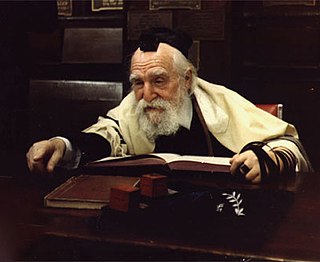
Moshe Feinstein was an American Orthodox rabbi, scholar, and posek. He has been called the most famous Orthodox Jewish legal authority of the twentieth century and his rulings are often referenced in contemporary rabbinic literature. Feinstein served as president of the Union of Orthodox Rabbis, Chairman of the Council of the Moetzes Gedolei HaTorah of the Agudath Israel of America, and head of Mesivtha Tifereth Jerusalem in New York.

Haym Soloveitchik is an American Modern Orthodox rabbi and historian. He is the only son of Rabbi Joseph B. Soloveitchik. He graduated from the Maimonides School which his father founded in Brookline, Massachusetts and then received his B.A. degree from Harvard College in 1958 with a major in History. After two years of post-graduate study at Harvard, he moved to Israel and began his studies toward an M.A. and PhD at the Hebrew University in Jerusalem, under the historian Professor Jacob Katz. He wrote his Master's thesis on the Halakha of gentile wine in medieval Germany. His doctorate, which he received in 1972, concentrated on laws of pawnbroking and usury. He is known to many as Dr. Gra"ch, after his great-grandfather for whom he is named, Rabbi Chaim Soloveitchik, who was known as the Gra"ch.
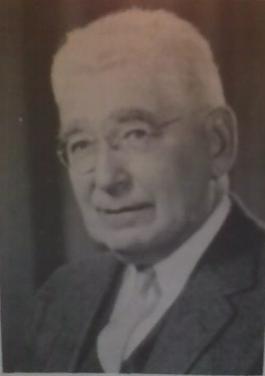
Solomon Bennett Freehof was a prominent Reform rabbi, posek, and scholar. He served as president of the Central Conference of American Rabbis and the World Union for Progressive Judaism. Beginning in 1955, he led the CCAR's work on Jewish law through its responsa committee. He also spearheaded changes to Reform liturgy with revisions to the Union Prayer Book (siddur). For many years, he served as the pulpit rabbi at Rodef Shalom in Pittsburgh, PA.
Gender and Jewish Studies is an emerging subfield at the intersection of gender studies, queer studies, and Jewish studies. Gender studies centers on interdisciplinary research on the phenomenon of gender. It focuses on cultural representations of gender and people's lived experience. Similarly, queer studies focuses on the cultural representations and lived experiences of queer identities to critique hetero-normative values of sex and sexuality. Jewish studies is a field that looks at Jews and Judaism, through such disciplines as history, anthropology, literary studies, linguistics, and sociology. As such, scholars of gender and Jewish studies are considering gender as the basis for understanding historical and contemporary Jewish societies. This field recognizes that much of recorded Jewish history and academic writing is told from the perspective of “the male Jew” and fails to accurately represent the diverse experiences of Jews with non-dominant gender identities.
Walter Jacob is an American Reform rabbi who was born in Augsburg, Germany, and immigrated to the United States in 1940.
Jewish medical ethics is a modern scholarly and clinical approach to medical ethics that draws upon Jewish thought and teachings. Pioneered by Rabbi Immanuel Jakobovits in the 1950s, Jewish medical ethics centers mainly around an applied ethics drawing upon traditional rabbinic law (halakhah). In addition, scholars have begun examining theoretical and methodological questions, while the field itself has been broadened to encompass bioethics and non-halakhic approaches.
In Jewish law, a posek is a legal scholar who determines the application of halakha, the Jewish religious laws derived from the written and Oral Torah in cases of Jewish law where previous authorities are inconclusive, or in those situations where no clear halakhic precedent exists.
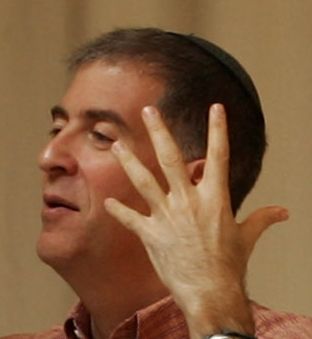
Donniel Hartman is an Israeli Modern Orthodox rabbi and author. He is President of the Shalom Hartman Institute in Jerusalem, Israel.
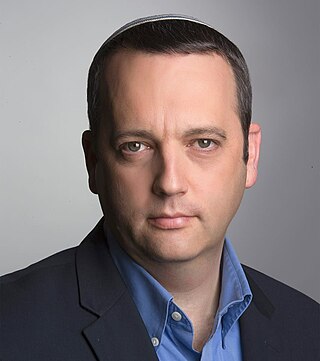
Gilad Kariv is an israeli attorney and a politician. The Executive Director of the Israel Movement for Reform and Progressive Judaism, he is currently a member of the Knesset for the Labor Party, at the 24-25 Knesset.
Joan Friedman became the first woman to serve as a rabbi in Canada in 1980, when she was appointed as an Assistant Rabbi at Holy Blossom Temple in Toronto. Her appointment was followed shortly after by that of Elyse Goldstein as Assistant Rabbi from 1983-1986; Goldstein has been called the first female rabbi in Canada, but that is incorrect.
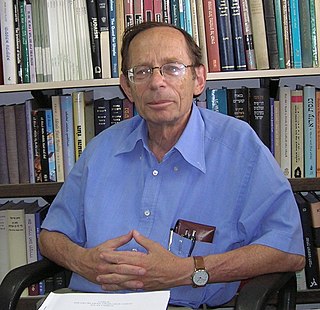
Gerald Blidstein was professor emeritus of Jewish philosophy at Israel's Ben-Gurion University of the Negev. He was the Israel Prize laureate in Jewish philosophy (2006) and had been a member of the Israel Academy of Sciences since 2007.













